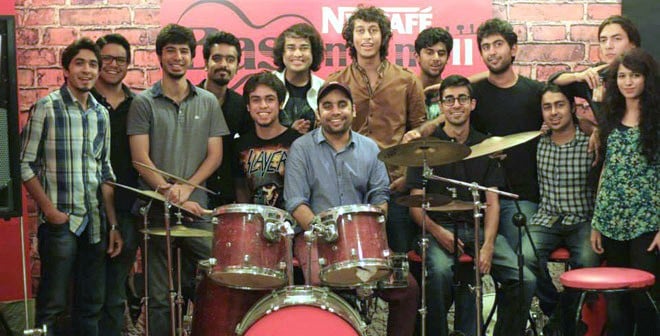

Coke Studio is definitely a Pakistani music success story. One great outcome is that it has encouraged young musicians and revived Pakistani music to an extent. Nescafe basement is a similar idea. Instead of looking for successful artistes, the basement tries out youngsters still in school and college -- the cut-off age being 25.
"This idea had been with me for many years now," said Xulfi, the founder and patron of Nescafe Basement who took this idea to Nescafe some years back. "I had seen many underground bands and singers with no platform to showcase their talent. Before the sessions begin, I plan the songs, but when the musicians gather in the studio, they decide what to do with the piece."
The way they make music is unique. The group jams together for six hours in the evening for three months in a row to come up with the final music. Each song takes three to four days and in the last two weeks of the basement, they record and shoot their songs. The songs are an organic product of group wok, fuelled by creative ideas from the whole team.
"This is why Nescafe basement doesn’t fit in a genre. In fact it is a genre in itself," said Xulfi. "The music is very different when it is composed by jamming instead of individual musicians."
Xulfi hopes that the basement will strengthen Pakistani music industry by introducing new talent and encouraging music aspirants to showcase their work even when they lack training.
Most of the songs are remixes of foreign and local musicians. Since they have input from all the performers, along with the fusion of eastern and western instruments, the compositions become very distinctive. Everyone generates his or her own idea to improve the composition and there is no formal composer leading this process.
"I am working with the same people from the basement again," said Haider Abbas, the Bassist in the Basement. "If you know the people, your coordination improves. The better friends you are, the more you understand each other’s music."
The first season had 12 people, selected from various schools and colleges in Lahore, Karachi and Islamabad. The pursuit for fresh voices became even more rigorous this season. A 100 people were auditioned for the first season, 1200 for the second one. The auditions take around 6 months.
The Basement’s second season just came to an end. They plan to give live performances now, together in different cities. Most of the musicians plan to continue their full-time careers and continue music on the sidelines. But they are very willing to start learning music professionally now and the intense jam sessions have helped them explore their own strengths and weaknesses.
The Basement has a lively website. Not only does it have some of the Basement’s jazzy numbers but also very peppy profiles of all the artists and teasers of each episode. Music websites so complete and creatively done are rare.
The show is just two seasons old and things are looking positive for some of the musicians already. They are already being offered concerts, have joined other bands and performed live with them. Two of them even sang the jingles for a leading fast-food band and one song by the basement is on the verge of becoming part of a mainstream Bollywood flick.
"When you sing with so many other talented people, you learn to harmonise and yet focus on your own vocals," said Parizae Azhar Malik, the youngest member of the Basement at 15. She is a student at the Lahore Grammar School and aspires to study music at a foreign university after her intermediate. "The best part is that you become a celebrity and everyone around you starts recognising you. This and the amazing feeling that people around the world are listening to your songs and appreciating them."